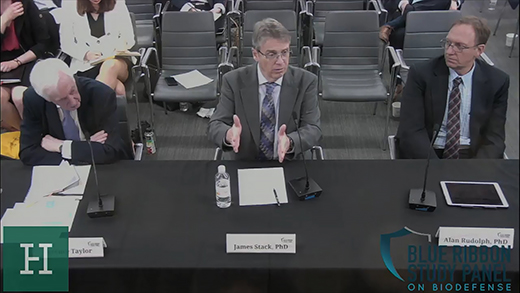May 1, 2018
Plant pathology director shares wheat blast expertise with Blue Ribbon Study Panel

James Stack, Kansas State University professor of plant pathology and director of the Great Plains Diagnostic Network, discussed wheat blast and improving global food security at a panel with the Blue Ribbon Study Panel on Biodefense.
The April 25 panel in Washington D.C. focused on transnational biological threats and global security.
Other members of the panel included Alan Rudolph, vice president for research at Colorado State University, and Terence Taylor, retired colonel in the British Army. The Blue Ribbon Study Panel on Biodefense — chaired by former Sen. Joe Lieberman and former Secretary of Homeland Security Tom Ridge — recommends changes to U.S. national policy and law to strengthen biodefense.
During the panel discussion, Stack offered comments on wheat blast, genome-based diagnostics and ides for improving global security. Plant health is important, he said, and four plant species — rice, wheat, maize and potatoes — supply 60 percent of the calories that sustain humans.
"Plant health is prerequisite to human health and well-being," Stack said. "We eat plants and we feed plants to the animals that we eat."
Stack described how global trade has been identified as a vehicle to enhance the economy, resolve poverty in developing nations and achieve global food security. But he also described how border inspections and prevention measures — although important — are insufficient to deal with the magnitude of introductions of new organisms and pathogens associated with global trade.
He provided details of the consequences of the 2016 wheat blast outbreak in Bangladesh and the 2017 outbreak in India. Early and accurate identification of plant pathogens is key to effectively responding to disease outbreaks and to preventing further outbreaks, Stack said, and it is important to fund research programs that improve diagnostics.
"We have embraced and are reaping the many benefits from the global economy, and we need to accept the responsibility for the consequences of that global economy," Stack said. "We need to build and maintain plant food systems with the ability to keep pace with transnational biological threats. The implications for global security with an expanding population are significant."
Watch the panel discussion at ustream.tv/recorded/114480083.
